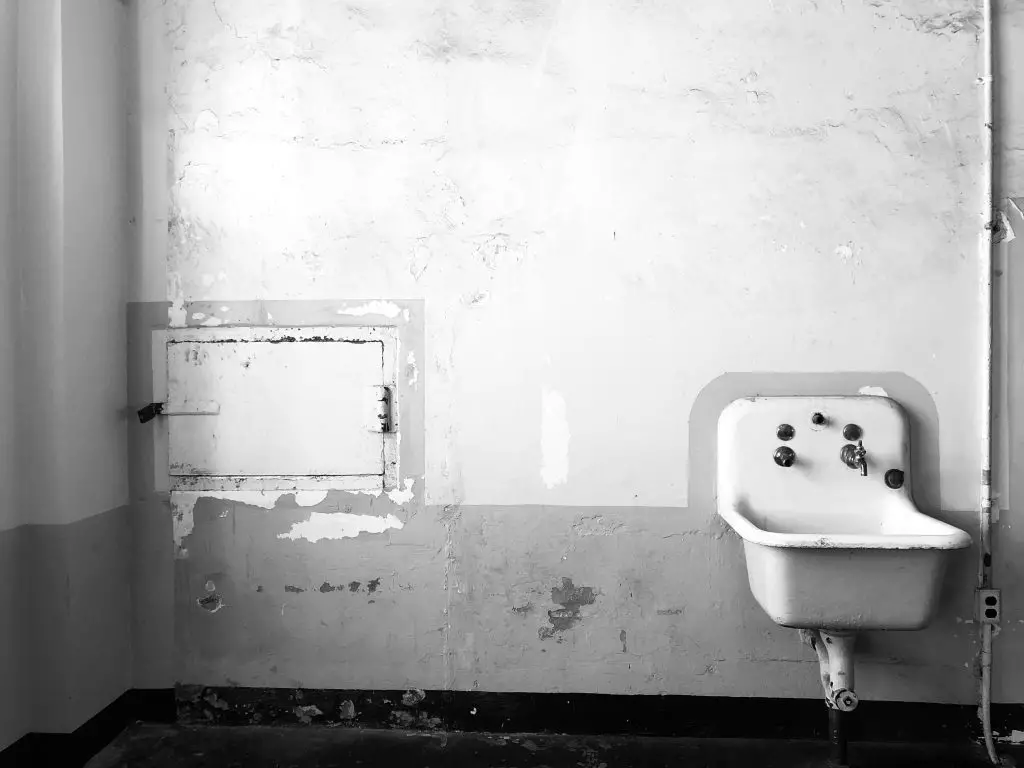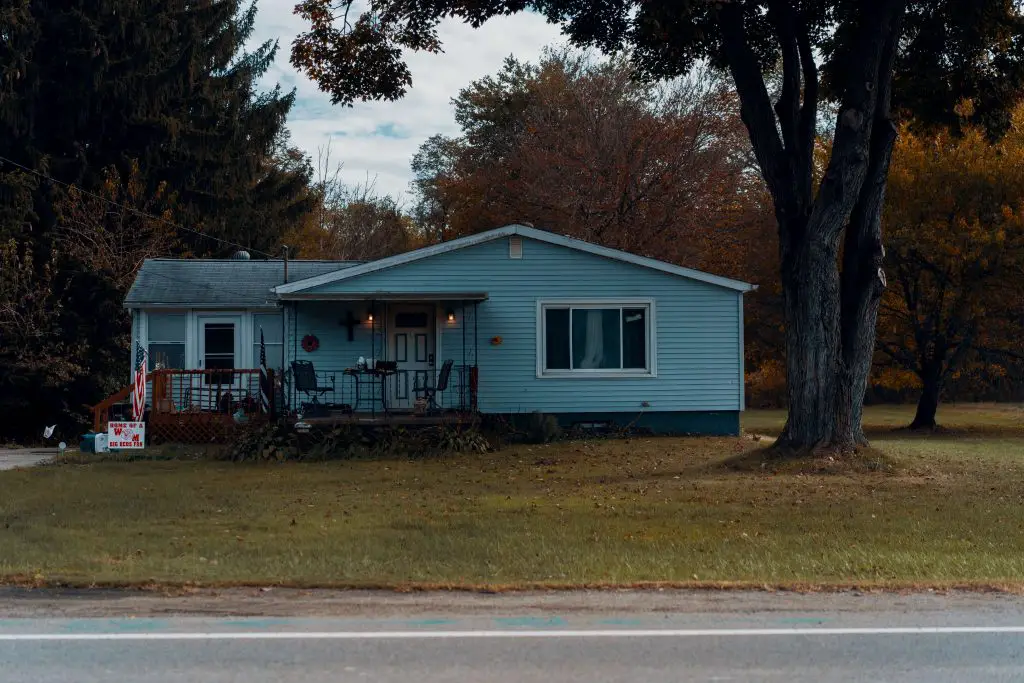If you have ever had any interest in becoming a section 8 landlord, you probably have heard a lot of reasons why you shouldn’t become one.
One of the most famous stereotypes associated with section 8 housing is that your section 8 tenants are going to rip out the kitchen sink somehow from the wall!
Potential section 8 landlords have this common believe that somehow section 8 tenants will use tools like jackhammers and crowbars to pry kitchen sinks away from cinder block walls.

Or that they may somehow turn your section 8 house into some type of run down house lacking windows with people just sitting around with wild chickens running around in the front yard as well.
It is basically a type of house you may see in some type of Harrison Ford movie where everybody’s riding three people deep on motorbikes built back in the late 1980’s!
As a licensed Realtor and landlord myself, I am here to tell you that that is not the case anymore.
In all actuality, now is one of the best times to become a section 8 landlord.
These rentals are one of the best ways how to make $2,000 a month in income.
I recently went incognito (concealing my personal finance blogger identity) to a real estate investors club meet up in my local area sponsored by The Monzo Group where the topic was everything you need to know about becoming a section 8 landlord.
What was great about this event was that there were local people at this meet up that currently had section 8 rentals and also representatives from my local public housing authority that walked everybody through the HUD section 8 landlord application.
I’m going to share with you all of the details of what I learned, what’s involved in the process, and why now is the best time to become a section 8 landlord.
What is Section 8
Section 8 is a federal housing assistance program that is run by the U.S. Housing and Urban Development (HUD) and administered via local public housing authorities.
It is also known as the housing choice voucher program in addition to section 8.
This voucher program provides rental assistance to tenants.
Tenants are also responsible for a portion of the monthly rent payment which is based on a formula by HUD. The ratio of what HUD will pay and what the tenant will pay is based on a lot of different circumstances and variables.
However the voucher amounts are calculated on fair market rents which are calculated by HUD.
In general, the families income may not exceed 50% of the median income for the county in which the family chooses to live.
The housing authority must provide 75% of its vouchers to applicants in which the applicants incomes does not exceed 30% of the area median income.
Types of Section 8
There are two different types of section 8 vouchers that are available.
Project-based Section 8
The project-based housing voucher is attached to a property. The owner can reserve part of his property if it is a large building for low income tenants.
When the tenant moves, the voucher will stay with the property.
You would see this situation more so with large scale buildings and possibly with a multiplex.
Tenant-based Section 8
Tenant-based section 8 on the other hand is when there is a housing voucher that stays with the tenant.
In other words, if the tenant moves, the voucher would move with the tenant to a new section 8 house for rental.
All of the details of tenant-based housing choice voucher program are available online below:
Tenant-Based Housing Choice Voucher Program
For the purposes of our discussion we will focus on the tenant based section 8 voucher.
Advantages to Section 8 Rentals
If you are on the fence about jumping into section 8 rentals, I definitely understand.
However there are so many advantages right now with the current state of the housing market that it might make sense for you to put section 8 housing as part of your rental portfolio. Not to mention, section 8 properties are a lot cheaper than traditional SFR’s therefore you can buy more units. It’s a solid way how to build wealth with low income as a strategy.
Related Article: Best 1031 Exchange Companies Near Me [Guidelines]
Reliable Rent Payments
One of the biggest advantages to the housing voucher program is that the payments that come directly from HUD are made on time. That’s a huge advantage for any section 8 landlord.
You’re going to receive a portion of your rent that comes from HUD guaranteed on time once the process is set up. You can even have it sent electronically to your bank account from HUD. It’s almost considered a form of passive income which has many advantages such as how to qualify for a mortgage wit passive income.
Less Vacancies
Due to the state of the current housing market (by that I mean it’s currently a seller’s market with an extreme lack of inventory at lower price ranges), a lot of people right now are being forced to rent.
A lot of people who would normally buy an entry-level home simply cannot find one due to the lack of inventory that exist right now in the market.
That makes it even harder for section 8 tenants to find section 8 housing for rent since there is an excessive supply of high priced rentals.
As a result there are long waiting lists that have section 8 tenants available, however there is no housing available for them to rent.
If you decide to become a section 8 landlord, you won’t have to worry about your property sitting vacant. You WILL make money immediately.
Potential For Long-term Tenants
Once you accept a section 8 tenant, there is a high probability that they will become a long-term renter. The reasons for this are mentioned above as there is just not a lot of section 8 landlords out there offering section 8 housing for renters.
So section 8 rentals can be considered as one of the best creative ways to make money simple because of the shortage of landlords right now.
Less Tenant Turnover
If you’re fortunate enough to have a section 8 tenant become a long-term renter, you’re going to have much less turnover.
Less turnover means more money in your pocket
Fair Market Rent
Another huge advantage is that you can charge market rates for rent for your section 8 houses. There is a system that calculates what the acceptable rent amount is for your county based on some variables.
You can’t charge absurd amounts for rent (they won’t be approved), but you can see area rental rates by using HUD’s database on how much HUD will pay for rent for a particular section 8 rental.
This will give you a general sense of rates in your area but there are other variables that affect this.
If you’re interested to see what the fair market rent is for your particular state and county you can go to the HUD Section 8 Landlord Portal found below to see that information.
Fair Market Rent: HUD Database
Rent Increases
One good thing about section 8 rentals is that most of the rent is not paid by the tenant. In other words, when you do raise the rent, it’s not going to affect your tenant as much.
This is because the majority of the payment is being made by the voucher program, not the tenant.
Rigorous Tenant Screening Process
Another huge advantage is the screening process that’s in place for section 8 tenants. Tenants also have to go through a criminal and background check in order to participate in HUD’s housing voucher program.
Having this additional step of tenant screening is a great way for a section 8 landlord to reduce potential risk because the housing authority is not going let everybody participate in the program.
They have to demonstrate certain benchmarks in order to participate.
Disadvantages to Section 8 Rentals
Rental Income Caps
One of the biggest disadvantages I see is that a section 8 landlord can’t charge more than fair market value for rent. So it could be possible that you might turn away a higher rent paying tenant for the section 8 housing voucher.
Fair market value is determined by the location and the number of bedrooms. How many participants can occupy one bedroom is defined as two heartbeats per bedroom according to the information provided by my local public housing authority.
A section 8 landlord is not allowed to charge the tenant more than fair market value for rent.
This is often the reason why you find section 8 houses for rent in lower renting neighborhoods.
However, I am going to reveal to you down below the secret how you can make this work and where you can get section 8 rental income in excellent communities!
Government Rental Regulations
As a section 8 landlord, you participate in a government subsidized housing voucher program. As such, there are a lot of rules and regulations you have to follow since this is a federal government program.
One of those is the fair market rent that we mentioned above, but there are is other issues as well.
For example, it takes approximately two months before you receive your first housing voucher payment from HUD.
There are other issues as well when tenants fail to pay their share of the rent.
Security Deposits
A section 8 landlord can’t charge more than one and a half month’s worth of rent for a security deposit.
The security deposits MUST come from the tenant themselves. You may have a hard time (or simply may not be able to) collect a security deposit upfront if the tenant does not have it. Additionally, HUD does not pay the security deposits.
Rent Increases
While you are allowed to request rent increases and adjustments, they have to be requested by the landlord at least 60 days in advance of the date change. Additionally the increase is subject to the rent reasonableness requirement.
Initial and Annual Inspection
As a section 8 landlord, you will have to complete an initial and annual inspection with the housing authority. We will cover more of this down below of what is involved.
Additionally the landlord is required and responsible to make any repairs to keep the housing unit in compliance with the local Housing Authority. The repairs have to be made in order to receive any rental payments from HUD.
Property Damage
No matter what type of rental you have (section 8 or not), there is always a risk for property damage.
The common thought here by landlords on section 8 tenants is that since they’re not paying the full rent amount, that they pose a greater risk by not taking care of the property.
The reality here is that if tenants are not taking care of the property, they can be kicked out of the housing voucher program.
They have to wait two years before they can reapply again.
So I don’t think property damage is necessarily any worse with a section 8 tenant than any other tenant but it is always a risk for any landlord section 8 or not.
Should You Accept Section 8 as a Landlord?
You may be struggling whether or not you want to become a section 8 landlord.
The answer to this question is different for every landlord you talk to. One advantage with investing in section 8’s is that it will take less effort to turn a profit than a traditional MFU or SFR due to the cost of housing. You can have positive cash flow quicker with sections 8 units than traditional units. Investing in section 8 units is one of the best ways to invest 50k in real estate because of the higher probability of turning a profit. After that point, it is just a snowball effect and you can add more section 8 unites with ease.
Two things that landlords place a lot of value on in general are:
- renters that pay on time
- long-term tenants
If the landlord has met those two criteria‘s, most of the time it’s considered a good investment and a good opportunity for the landlord. Section 8 units fit both of those criteria.
Section 8 Rental Alternatives
If you don’t think being a section 8 landlord is in the cards for you, there are still other real estate investment opportunities such as Fundrise where yes you can still invest in rentals, but play a much more passive role.
Current rates of return with Fundrise are between 7% and 13%, although they do fluctuate with the market and depending on how much risk you want to carry.
However, you can start investing with as little as $500.
[Checkout Fundrise’s Real Estate Investment Starter Packet which offers their lowest-ever $500 minimum investment and other special offers to new investors!]
There is also Roofstock for real estate investors where buyers and sellers can list their properties all while not disturbing tenants rights. They also include market and community data with detailed information on average rents in areas.
The one disadvantage with these options is that you are losing out on not only all of the tax deductions that come with owning a rental property, but also saving money on taxes that you pay because of things such as the laws on passive losses.
That’s the trade-off to passive investing.
How to Become a Section 8 Landlord
The first obvious step is that you will need to have a house available to rent. If you don’t have one, you will have to obtain a mortgage.
Check out our article on 7 steps to getting a mortgage loan and saving money for some tips.
There are other uncommon ways to come up with the money and cash resources such as moving into a housing cooperative that are necessary to start up a section 8 rental business.
If you want to become a section 8 landlord, the steps below will take you more through the program requirements and process.
You should also consider the pros and cons of hiring an accountant to see if you need one.
Section 8 Landlord Program Requirements
There are a couple ways to get started as a section 8 landlord with tenants.
Find a Section 8 Tenant
The first thing to do is contact the local housing authority. They will have a waiting list for tenants that have been approved for the housing voucher. You can find a list down below of your local housing authority that has contact information.
In the off chance that your local housing authority won’t assist you with securing tenants, you can also go out and find a tenant on your own.
Landlord Must Provide a Lease
The landlord is required to provide a lease that is consistent with all state and local laws in the housing authority contract.
The lease is between the landlord and the tenant, however your local housing authority must approve the lease. The lease must state which utilities and appliances are provided for or paid by the tenant, and which the section 8 landlord will provide.
It’s important that the lease states specifically who will reside in each unit.
Only people approved by the housing authority can be listed on the lease to live in the unit.
All section 8 leases have to be a minimum of one year or more.
HUD Section 8 Landlord Application
In addition to the lease and the tenant being approved, the landlord must fill out an application with HUD.
Contact your local public housing authority as they are the ones that administer this program.
They will have the Sect 8 landlord application packet that needs to be completed and can also direct you to the section 8 landlord portal.
Section 8 Landlord List: Inspection
Part of the approval process to become a section 8 landlord is there has to be an initial inspection of your property. This is done to make sure it meets all local, state, and federal laws in regards to safety and codes. (It’s also a very similar process to a VA home appraisal checklist.)

The unit will be inspected by the public housing authority to make sure your section 8 rental complies with HUD’s minimum housing quality standards.
Some of the items that are covered in the section 8 inspection requirements by the public housing authority are included below:
- Utilities and Appliances:
All utilities are on and supplied appliances are installed and hooked up. A lot of section 8 landlords look for where to buy used appliances nearby and use those instead of brand new appliances in their units. If a section 8 landlord elects to repair the appliances, there are ways how to save money on appliance repairs that can be followed.
- Clean Units:
Units must be cleaned before initial inspection. This includes floors, walls, ceilings, fixtures, cabinets, cupboards, drawers, sinks, tubs, toilets, windows, closet storage, interior rooms, basement, garage, and shed areas.
All personal property that does not belong to the new tenant has to be removed.
Additionally, if appliances are staying those have to be cleaned as well.
- Fireplace:
If the unit has a fireplace or a wood-burning chimney, there is a certification required by a licensed contractor to show that the stove or fireplace is safe to use.
- Smoke Detectors and Carbon Monoxide Detectors:
Working smoke detectors must be located in the main area on each level of the unit.
Smoke and carbon monoxide detectors are required outside of bedrooms.
Whether a section 8 landlord or a regular landlord, you must have working smoke and carbon monoxide detectors.
- Electrical:
Make sure that all outlets are properly wired. GFCI outlets also tripped and reset as designed. You can purchase your own tester for $10 or less.
All three prong outlets must be grounded and make sure there are no broken outlets or switch plates missing. GFCI outlets are required within 6 inches of water.
- Exterior
If you have ever had an FHA mortgage before, you know that HUD is very strict about peeling paint. The same is true with section 8 rentals.
Make sure that there is no peeling paint on the exterior of your section 8 rental house.
Additionally, you want to make sure there are no open holes or deteriorating structures. Make sure required railings are installed and secured.
A big items that people often overlook is the dryer vent. Make sure that it is not broken or missing.
- Interior:
Just like the exterior, the interior should be free of peeling paint and open holes in drywall. This excludes the basement and garage areas.
Make sure there is no exposed insulation or subfloor. The carpet has to be clean and in livable condition.
You must replace it if it is stained or has a trip hazard such as a tear.
Another big item that inspectors cite on their inspections is loose tiles or missing floor tiles or flooring.
Make sure all of your cupboards counters and cabinets are secured and that the drawers work properly.
- Windows and Doors:
The windows and doors are required to open and close. They also have to stay open especially for windows.
You want to make sure that the windows do not drop. They also have to have a locking function. This locking function must be keyless.
The windows must be functional and easily opened in the event of a fire or an emergency escape.
You also want to make sure that none of the glass is cracked on the windows.
- Plumbing:
All of your drains have to be free of clogs, leaks, and drain at a decent speed. All of your sinks must have trap pipes and there has to be adequate water pressure in your section 8 house for rent.
- Bathroom Venting:
All bathrooms must have a working vent or functioning window.
- Water Tank:
Hot water tanks must have a discharge tube. The discharge tube can be CPVC, copper, or galvanized steel.
Most of these hot water tanks have the discharge tube threaded from the top of the hot water tank. Bottom threads are not allowed.
These are just some of the section 8 inspection requirements that are necessary. They are also referred to as the section 8 landlord‘s list.
By knowing what these requirements are, you’ll be able to pass your inspection with your public housing authority issue-free.
If you need help to accomplish these tasks or schedule repairs for units, an unlicensed real estate assistant is a great option to consider.
Terminating a Section 8 Lease
There will be times where leases will be terminated.
This can happen by the tenant, by the landlord, or it could be a mutual agreement to terminate the lease as well.
Lease Termination: By Tenant
After the initial lease term, the tenant may terminate the contract within 30 days of advance written notice to the landlord and the public housing authority. Figure out can you put your electric bill in someone else’s name for the property once tenant leaves.
Lease Termination: Mutual Lease Termination
The lease can mutually be terminated when the tenant and landlord jointly agree to terminate the section 8 lease.
The termination must be in writing and accompany a mutually termination agreement form. That form often times is available from the local public housing authority.
Lease Termination: By Landlord
If you are a section 8 landlord and want to terminate the lease, all reasons for lease termination not only have to go to the tenant, but also to your local public housing authority at the same time.
There are a lot of reasons why a section 8 landlord may terminate a lease some of those are listed below:
- You have serious or repeated violations of the terms and conditions of the lease.
- A family history of disturbance of neighbors, or destruction of property, or living conditions that are resulting in damage to the property.
- Criminal activity, drug activity, alcohol abuse, or violent criminal activity by the tenant family members or guests that may affect other residents in the community.
- Violations of federal, state, or local laws.
- Once the initial lease term is up, a landlord may terminate the lease because the landlord may want to use the property for a different use.
- Section 8 landlord decides to rent out the property at higher market rates instead.
Section 8 Housing Tips for Landlords
I mentioned up above there are ways a section 8 landlord could potentially profit depending on a certain type of section 8 housing.
Now if you have a single-family home in a good neighborhood and location it may become very difficult to profit with section 8 income and housing assistance.
Not only will the price of the house be more, but you’re also faced with higher carrying costs such as property taxes as well.
However, there are other ways to save money on housing costs and still turn a profit. What a section 8 landlord should do is look at available condominiums in established communities.
I’m not talking about multi-story or three-story townhomes, but rather the type of condominiums that look like apartments.
Often times, these are far less in cost than what a traditional condo might cost in a stabilized neighborhood.
You will have to check with the condominium association to see if there are any regulations about whether or not section 8 tenants are allowed or prohibited.
Remember the public housing authority does pay fair market value for rent and a lot of it is determined by the number of bedrooms.
If you’re able to find an apartment type condominium with two bedrooms you may be able to turn a good profit with section 8 tenants.
Another great advantage about utilizing a condominium for this purpose is that the condominium association is often required to handle a lot of the exterior maintenance issues as well.
Screening Tenants
One way to prevent property damage is to thoroughly screen your tenants. This is key for becoming a successful section 8 landlord.
Make sure you list out all the criteria you are screening for and if they have rented before, make sure you get references from previous landlords.
Remember though you have to be in compliance with the landlord fair housing laws as well.
Conduct Multiple Property Inspections
Your public housing authority will inspect the property annually. However you may want to inspect it as well every six months.
The more often you inspect, the less likely issues may come up that have to be fixed or repaired.
It is also a good way to get a visual confirmation of the condition of the property as well.
Work With Your Local Public Housing Authority
One of the best tips I heard from other section 8 landlord’s when I attended an investors meet up what is that a lot of the landlords worked with their local public housing authority.
For example when issues came up with a tenant, not only did the landlord communicate with the tenant about it, but they also communicated with the local public housing authority.
This is important because the local public housing authority does not want tenants that do not follow the rules and adhere to the policies and regulations of the program.
So the local public housing authority also talked to the tenant and sent letters to them as well if they were late on rent payments.
The housing authority often times would assist the section 8 landlord when issues come up acting almost like a coalition so the tenant can stay in compliance and not wind up on the street.
This is the Best Time to be a Public Housing Landlord
When I attended my local real estate investors club meetup, I didn’t actually know the topic was going to be section 8 rentals.
There was a representative there from our local public housing authority.
They explained that they have 71 people on a waiting list and there are no available section 8 properties available for these tenants.
Now I’ve always been a conservative and cautious guy there’s no question about that. However, a lot of what the public housing authority told me did make sense financially.
- Given the lack of inventory at lower price ranges right now there is an extremely limited supply of affordable housing.
That’s a fact.
The numbers make sense to become a section 8 landlord.
When you have 71 people that are waiting to get into a property, those tenants are not going to be ripping out your kitchen sink for a lot of reasons.
The main reason is that they know if they screw up in the program and get kicked out, more than likely they will have to go to a homeless shelter.
You cannot get re-enlisted in the section 8 housing program for a minimum of two years.
So I do believe that the people that are going to rent your home will be treating it with care and respect because the stakes right now are so high for them.
Those are just some of the financial and market conditions of why it does make sense right now to be a section 8 landlord.
How to Find Section 8 Houses For Rent
If you are looking for section 8 houses for rent, you can go to the U.S. Department of Housing and Urban Development website.
This site offers low income housing that is available for tenants.

Additionally, you can also call your local public housing authority as well as they also maintain their own list of section 8 houses for rent. Make sure you have the right insured non-residential grant deed for the property.
Section 8 Rentals: FAQ’S
Can a Section 8 Landlord Rent to a Friend?
It would all depend if the friend has been approved by the public housing authority and has met all of the income requirements and limitations.
Can a Section 8 Landlord Rent to a Family Member?
Generally no. A section 8 landlord cannot rent to any family member or related relatives. This would include parents, children, grandparents, grandchildren, and siblings. Occasionally an exception may be granted if it is necessary to provide reasonable accommodations for a family member with disabilities.
Does Section 8 Pay for Tenant Damages?
No. There is no reimbursement for tenant damages. The only option available is the security deposit that the landlord collects directly from the tenant to cover any tenant damages.
Final Thoughts
For all of these reasons above, there has never been a better time to become a section 8 landlord than right now. While there is a lot that is involved from a regulation and policy standpoint, it does offer guaranteed rental income every month from HUD.
If you are able to secure section 8 tenants, there’s a very good chance that they can turn into long-term tenants.
Additionally, your section 8 income can also turn into a passive income and rental stream for your rental portfolio. There has never been a better time to be a section 8 landlord.





Leave a Reply